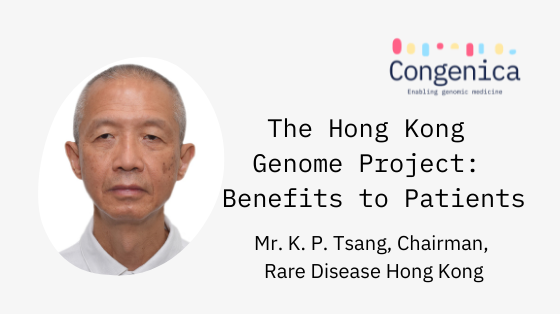The following article has been written for Congenica by by Mr. K. P. Tsang, Chairman, Rare Disease Hong Kong, supported by Zeng Jianping, following the news that Congenica is to provide Tertiary Analysis for Whole Genome Sequencing for Hong Kong Genome Project.
Human genome refers to all DNA (deoxyribonucleic acid) in human cells. Genetic variants are one of the important causes of diseases, so genomic medicine which uses genetic data to support clinical treatment has been an important sphere in contemporary medicine and scientific research, with huge potential especially in disease screening, diagnosis and personalized treatment.
The Genome Project enables genomic medicine to be integrated into medical care and provides potentially great clinical benefits to patients as well as family members, especially for rare disease diagnosis and personalized treatment for cancer patients.
Since the clinical features of some rare genetic diseases are not obvious and vary among different cases, it is often difficult for clinicians to diagnosis with traditional and routine tests only. The diagnosis odyssey lasts for years usually, patients have to do plenty of tastings and visit different hospitals frequently, which is a heavy burden to the patient and family. It is reported that whole genome sequencing would increase the diagnosis rate of rare disease from ~10% to ~30-40% and enable clinical management that is more suitable for patient needs, including targeted diagnostic testing, drug treatment, surgical operations, monitoring and the patient’s lifestyle. Once the patient gets diagnosed, it is helpful to relieve the pressure on family members, including parents who will get to know the genetic risks and and be able to make the birth plan properly.
In addition to improving the diagnosis of rare diseases, the Genome Project can also provide more details on how variants are relevant to cancers, assist clinicians to choose the most effective treatments for individuals based on molecular results and to achieve personalized treatment.
When the 100,000 Genomes Project was announced in 2012 in the United Kingdom, the principal objective was to sequence 100,000 genomes from patients with cancer and rare disorders, etc, and to link the sequence data to a database. 100,000 genomes were completely sequenced in 2019 taking a total of around six years.
The Hong Kong Genome Project has been officially launched after years of preparation. We look forward to the implementation of the Genome Project and its benefits to patients.

.png?width=320&height=192&name=Untitled%20design%20(8).png)
.png?width=320&height=192&name=Since%202016%2c%20the%20number%20of%20women%20working%20in%20STEM%20fields%20in%20the%20UK%20has%20increased%20by%20216%2c552%2c%20taking%20the%20total%20number%20over%20the%201%20million%20mark%20for%20the%20first%20time.%20Women%20now%20make%20up%2024%25%20of%20the%20STEM%20workforce%20i%20(2).png)
-1.png?width=320&height=192&name=Deciphering%20Developmental%20Disorders%20(1)-1.png)